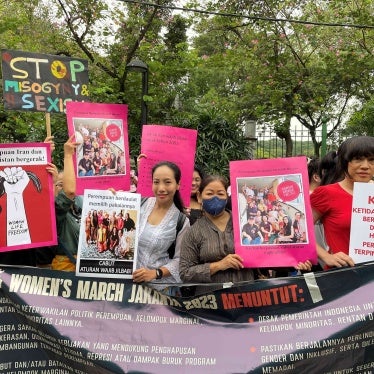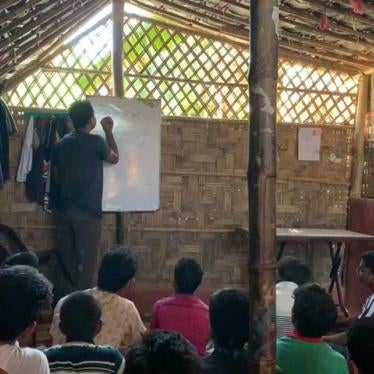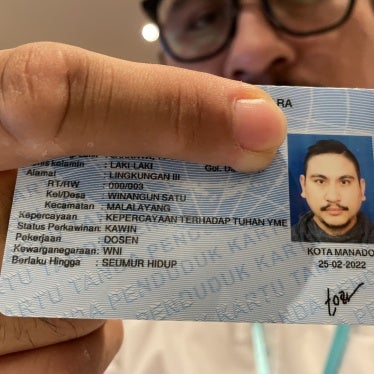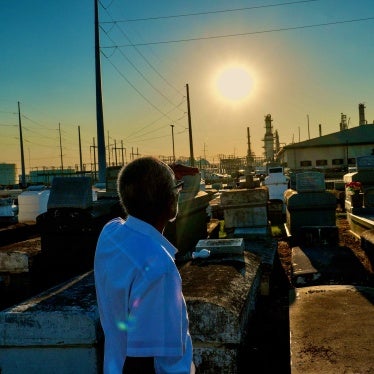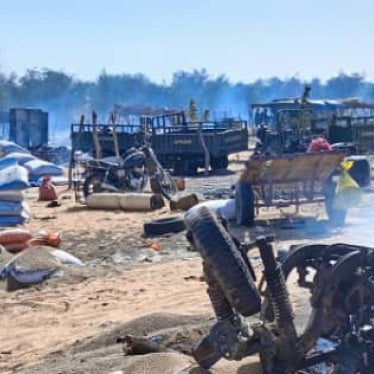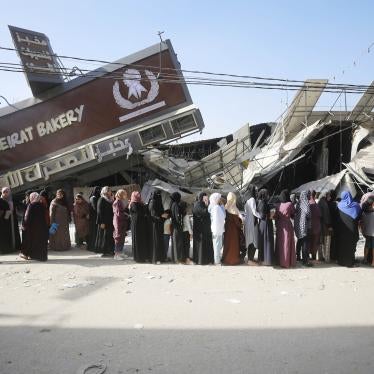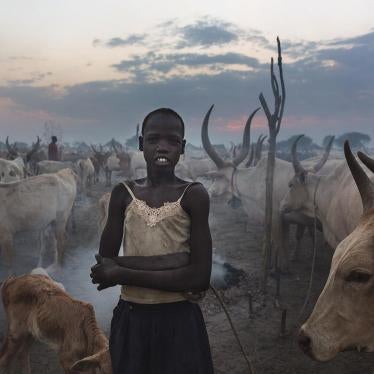(Jakarta) – Indonesian authorities should immediately stop all pushbacks of boats carrying ethnic Rohingya refugees, and investigate and end all assaults on refugees, Human Rights Watch said today. The authorities should allow them to disembark in the nearest safe port, provide protection and humanitarian assistance, and investigate online incitement of violence against them.
On December 27, 2023, more than 100 students broke through police lines and stormed a car park in the city of Banda Aceh, where 137 Rohingya refugees, mostly women and children, had been temporarily placed. The students verbally and physically assaulted the refugees, then forced them onto trucks, which transported the refugees to the government office responsible for immigration where the students demanded the refugees be deported. Elsewhere in Aceh province, residents have tried to prevent Rohingya boats from reaching the shore, and surrounded the tents of Rohingya on beaches and other temporary locations, and demanded that they be relocated.
“The Indonesian government should ensure that Rohingya boat refugees are immediately brought ashore and protected, not pushed back to die at sea, or be attacked by anti-Rohingya mobs,” said Phil Robertson, deputy Asia director at Human Rights Watch. “The government should investigate and hold accountable whoever has been mobilizing an online campaign inciting violence against Rohingya arrivals.”
The United Nations High Commissioner for Refugees (UNHCR) reported that since November, 11 Rohingya boats have landed and the refugees relocated to informal sites, mostly in Aceh and one in North Sumatra. At least 1,700 Rohingya refugees, more than 70 percent of them women and children, have landed in the two provinces since November.
A Rohingya refugee who has been living in Aceh since early 2023 told Human Rights Watch that his wife, their two children, and his brother were part of the group attacked on December 27.
“In the video on social media, I saw my kids hit by things the students were throwing,” he said. “My wife was crying along with other Rohingya, and my brother was lying on the ground. He was so hungry because the group didn’t have food for many days while they were floating out at sea.”
The man said he has been unable to reunite with his family due to the risk of further attacks, and is regularly receiving calls from traffickers threatening to kidnap his family from their temporary shelter.
On December 27, UNHCR said that the Rohingya have faced “a coordinated online campaign of misinformation, disinformation and hate speech against refugees and an attempt to malign Indonesia’s efforts to save desperate lives in distress at sea.”
Recently created anonymous accounts on Instagram, TikTok, and X, formerly known as Twitter, have spread disinformation and misinformation about Rohingya refugees that has put their safety at risk. Anonymous accounts also identified local UNHCR staff in Aceh and published personal information (“doxing”), leading to numerous online threats and personal risks in carrying out their work. The social media monitoring and fact-checking organization Drone Emprit analyzed posts from December 2-8 and found a campaign of false information and hate narratives against Rohingya.
The Indonesian authorities should urgently investigate alleged organizers of incitement against Rohingya refugees and take appropriate action to hold those responsible to account, Human Rights Watch said.
On December 28, the Indonesian navy pushed a Rohingya boat back out to sea off Weh Island, Aceh’s northernmost area. This contravened Indonesia’s search-and-rescue obligations at sea and international legal obligations to provide access to asylum and to not return anyone to a place where they would face a real risk of persecution, torture, or other ill-treatment. The pushback was also not in keeping with Indonesia’s longstanding humanitarian reputation for assisting refugees at sea, including Rohingya.
Southeast Asian governments should undertake greater regional and international cooperation to respond to boats carrying Rohingya refugees in distress, including coordinated search-and-rescue operations and timely disembarkation at the nearest safe port, Human Rights Watch said. The governments of Indonesia, Malaysia, and Thailand should provide Rohingya refugees with access to fair asylum procedures and ensure that they are not indefinitely detained, held in inhospitable conditions, or threatened with being forcibly returned to Myanmar.
Rohingya are being driven to high-risk sea voyages due to growing restrictions and hopelessness in the refugee camps in Bangladesh and unending oppression and violence in Myanmar. Most are looking to ultimately reach Malaysia where an existing Rohingya community holds the promise of work, although many who arrive end up in immigration detention. More than 3,500 Rohingya attempted dangerous sea crossings in the Andaman Sea and Bay of Bengal in 2022, a fivefold increase over the previous year, at least 350 of whom died or were reported missing.
In the past two years, the one million Rohingya refugees in Bangladesh have faced escalating gang violence and ration cuts and increasing restrictions by the authorities.
The Rohingya who remain in Myanmar’s Rakhine State are subject to persecution and violence, confined to camps and villages without freedom of movement, and cut off from access to adequate food, health care, education, and livelihoods. Conditions for the safe, sustainable, dignified return of Rohingya refugees currently do not exist, given the frequent serious human rights violations by the Myanmar junta and ongoing crimes against humanity of apartheid and persecution.
“The Indonesian authorities should fully investigate who is disrupting the practice of fishermen and villagers in Aceh to assist Rohingya refugees arriving in rickety boats and offer them assistance,” Robertson said. “Indonesia should not join other Southeast Asian countries that have been pushing back Rohingya boats and letting these desperate people float away to their deaths.”

